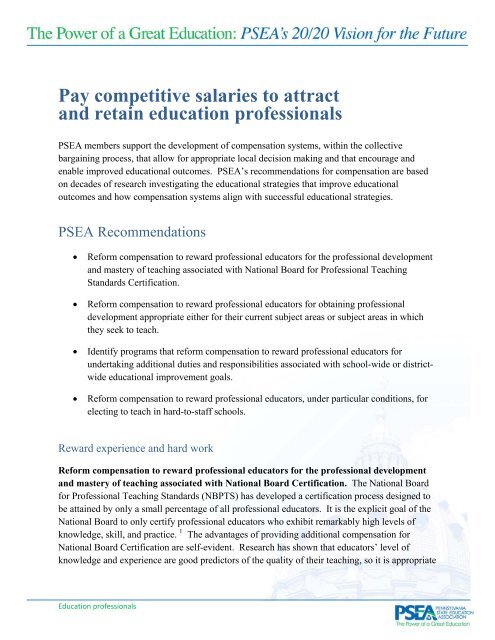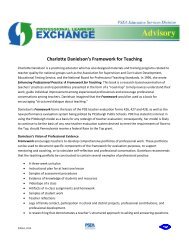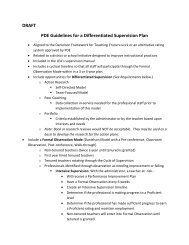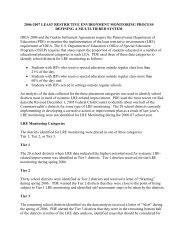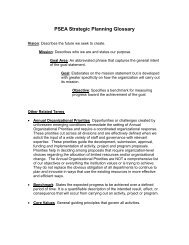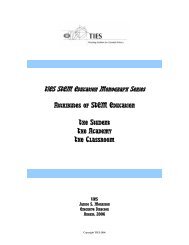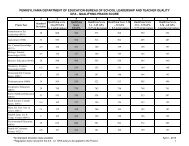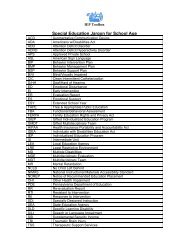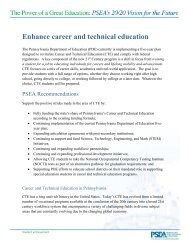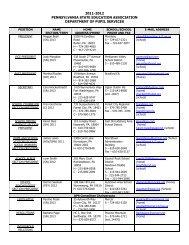Pay competitive salaries to attract and retain education professionals
Pay competitive salaries to attract and retain education professionals
Pay competitive salaries to attract and retain education professionals
Create successful ePaper yourself
Turn your PDF publications into a flip-book with our unique Google optimized e-Paper software.
<strong>Pay</strong> <strong>competitive</strong> <strong>salaries</strong> <strong>to</strong> <strong>attract</strong><br />
<strong>and</strong> <strong>retain</strong> <strong>education</strong> <strong>professionals</strong><br />
PSEA members support the development of compensation systems, within the collective<br />
bargaining process, that allow for appropriate local decision making <strong>and</strong> that encourage <strong>and</strong><br />
enable improved <strong>education</strong>al outcomes. PSEA’s recommendations for compensation are based<br />
on decades of research investigating the <strong>education</strong>al strategies that improve <strong>education</strong>al<br />
outcomes <strong>and</strong> how compensation systems align with successful <strong>education</strong>al strategies.<br />
PSEA Recommendations<br />
• Reform compensation <strong>to</strong> reward professional educa<strong>to</strong>rs for the professional development<br />
<strong>and</strong> mastery of teaching associated with National Board for Professional Teaching<br />
St<strong>and</strong>ards Certification.<br />
• Reform compensation <strong>to</strong> reward professional educa<strong>to</strong>rs for obtaining professional<br />
development appropriate either for their current subject areas or subject areas in which<br />
they seek <strong>to</strong> teach.<br />
• Identify programs that reform compensation <strong>to</strong> reward professional educa<strong>to</strong>rs for<br />
undertaking additional duties <strong>and</strong> responsibilities associated with school-wide or districtwide<br />
<strong>education</strong>al improvement goals.<br />
• Reform compensation <strong>to</strong> reward professional educa<strong>to</strong>rs, under particular conditions, for<br />
electing <strong>to</strong> teach in hard-<strong>to</strong>-staff schools.<br />
Reward experience <strong>and</strong> hard work<br />
Reform compensation <strong>to</strong> reward professional educa<strong>to</strong>rs for the professional development<br />
<strong>and</strong> mastery of teaching associated with National Board Certification. The National Board<br />
for Professional Teaching St<strong>and</strong>ards (NBPTS) has developed a certification process designed <strong>to</strong><br />
be attained by only a small percentage of all professional educa<strong>to</strong>rs. It is the explicit goal of the<br />
National Board <strong>to</strong> only certify professional educa<strong>to</strong>rs who exhibit remarkably high levels of<br />
knowledge, skill, <strong>and</strong> practice. 1 The advantages of providing additional compensation for<br />
National Board Certification are self-evident. Research has shown that educa<strong>to</strong>rs’ level of<br />
knowledge <strong>and</strong> experience are good predic<strong>to</strong>rs of the quality of their teaching, so it is appropriate<br />
Education <strong>professionals</strong>
<strong>to</strong> provide financial incentives for the higher levels of mastery that teachers obtain as they gain<br />
experience. In many school districts in Pennsylvania, teachers are being rewarded for<br />
successfully completing this arduous national certification process.<br />
Unfortunately, in most cases the additional compensation does not reflect the appropriate value<br />
of teachers holding a National Board Certificate. The application process for National Board<br />
Certification takes approximately 400 hours <strong>to</strong> complete, the equivalent of 10 full-time, laborintensive<br />
work weeks while the applicants continue <strong>to</strong> hold their full-time teaching positions.<br />
The fact that teachers are motivated <strong>to</strong> complete this process for minimal additional<br />
compensation shows their work ethic. PSEA supports using federal funds <strong>to</strong> provide $5,000<br />
annual incentives <strong>to</strong> teachers who achieve National Board Certification.<br />
Reform compensation <strong>to</strong> reward professional educa<strong>to</strong>rs for obtaining professional<br />
development appropriate either for their current subject areas or subject areas in which<br />
they seek <strong>to</strong> teach. Research shows that high-quality professional development can have a<br />
significant impact on student achievement. Teacher compensation reform should encourage<br />
professional educa<strong>to</strong>rs <strong>to</strong> achieve additional, appropriate knowledge <strong>and</strong> skills <strong>and</strong> compensate<br />
them for bringing the additional knowledge <strong>and</strong> skill in<strong>to</strong> the classroom. The single salary<br />
schedule, used properly, already provides the framework for this reform. If anything, a<br />
significant problem in Pennsylvania is that the current levels of additional compensation for<br />
additional knowledge <strong>and</strong> skills are <strong>to</strong>o low.<br />
Education <strong>professionals</strong>
Identify programs that reform compensation <strong>to</strong> reward professional educa<strong>to</strong>rs for<br />
undertaking additional duties <strong>and</strong> responsibilities associated with school-wide or districtwide<br />
<strong>education</strong>al improvement goals. Compensation strategies for professional educa<strong>to</strong>rs need<br />
<strong>to</strong> align compensation with the extra duties associated with school-wide <strong>and</strong> district-wide<br />
<strong>education</strong>al improvement goals. Additional duties <strong>and</strong> responsibilities require additional effort<br />
<strong>and</strong> time. Men<strong>to</strong>ring is one example. Men<strong>to</strong>ring is especially important now in Pennsylvania as<br />
we are experiencing a major demographic shift in the teacher labor force as teachers hired in the<br />
1970’s retire <strong>and</strong> are replaced by less experienced teachers.<br />
Reform compensation <strong>to</strong> reward professional educa<strong>to</strong>rs, under particular conditions, for<br />
electing <strong>to</strong> teach in hard-<strong>to</strong>-staff schools. PSEA recognizes that certain schools are harder <strong>to</strong><br />
staff for a variety of reasons. However, the evidence is far from clear about what level of<br />
compensation <strong>and</strong> what types of contractual commitments from both schools <strong>and</strong> teachers would<br />
be necessary <strong>to</strong> <strong>attract</strong> <strong>and</strong> <strong>retain</strong> a sufficient number of high-quality c<strong>and</strong>idates who are not<br />
otherwise predisposed <strong>to</strong> desire the challenges of teaching in hard-<strong>to</strong>-staff schools. One potential<br />
solution for high-poverty/hard-<strong>to</strong>-staff schools is <strong>to</strong> require a five-year commitment from those<br />
provided additional pay <strong>to</strong> work in hard-<strong>to</strong>-staff schools <strong>and</strong> a five-year commitment from the<br />
school district <strong>to</strong> continue <strong>to</strong> provide additional pay. PSEA believes the decision <strong>to</strong> provide<br />
additional pay for hard-<strong>to</strong>-staff schools should be made through the collective bargaining<br />
process. These teacher pay reform strategies are best made within the context of a single salary<br />
schedule.<br />
How <strong>to</strong> use the federal incentive program funds such as the Race <strong>to</strong> the Top (RTTT)<br />
initiative. From a policy perspective, it would be beneficial <strong>to</strong> use some RTTT funds <strong>to</strong> design<br />
scientifically valid pilot programs in districts with the intent of measuring the effect of teacher<br />
pay reform in comparison <strong>to</strong> other reforms that have been proven <strong>to</strong> work, such as smaller class<br />
sizes <strong>and</strong> parental involvement. The information gleaned from this approach would have a<br />
significant long-term impact by providing sufficient data for significant research on the changes<br />
that have the greatest effects on student learning.<br />
(01/10)<br />
1 For a comprehensive review of the research on the effectiveness of teachers certified by the National Board for Professional<br />
Teaching St<strong>and</strong>ards see Hakel, M., Koenig, J, <strong>and</strong> Elliot, S. (2009) Assessing Accomplished Teaching: Advanced Level<br />
Certification Programs. Washing<strong>to</strong>n D.C.: The National Research Council of the National Academies.<br />
Education <strong>professionals</strong>


